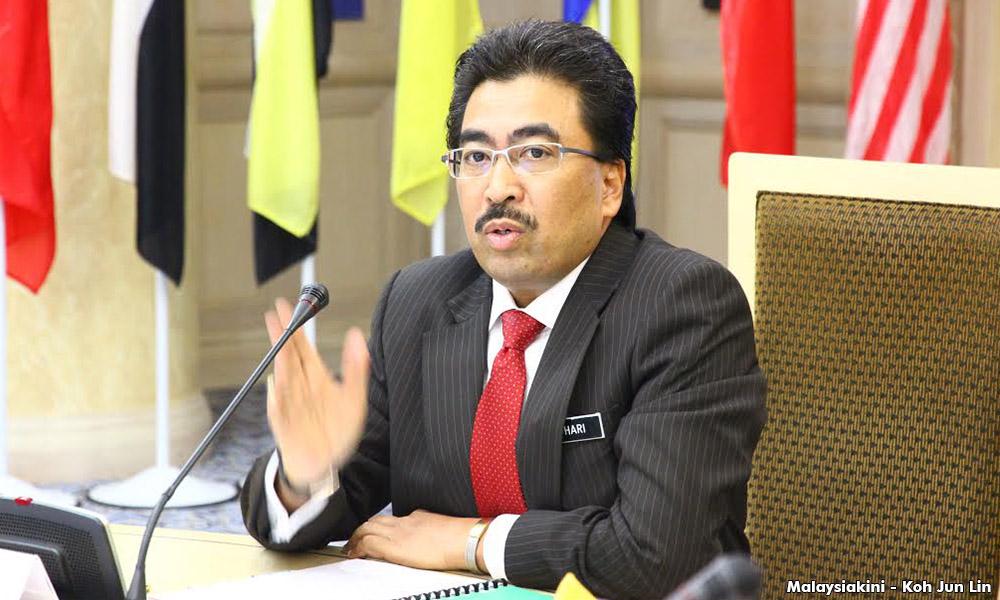PKR secretary-general Rafizi Ramli today said he pursued the issue of the steam boiler plant project in Kerteh, Terengganu, for months in 2014.
Rafizi said this in response to Second Finance Minister Johari Abdul Ghani, who said yesterday that it is not fair to ask the government to use taxpayers' money for bailouts, after complaints from the local contractors involved in the project.
Johair was responding to 16 contractors who claimed that the government had shirked on its promise to ensure they get paid RM26 million for work they did on the government-linked project.
"I am not sure whether Johari remembers that I had brought this issue up for months, in 2014, because it involves an intervention by the prime minister himself, or if Johari is trying to embarrass Prime Minister Najib Abdul Razak on purpose," Rafizi said in a statement today.
 He reminded Johari (photo) that the Prime Minister's Office (PMO) had issued a letter, dated Nov 21, 2013, to the then minister heading the Science, Technology and Innovation Ministry (Mosti), Ewon Ebin, asking the ministry to consider a research and development (R&D) grant of RM100 million for the steam boiler plant project.
He reminded Johari (photo) that the Prime Minister's Office (PMO) had issued a letter, dated Nov 21, 2013, to the then minister heading the Science, Technology and Innovation Ministry (Mosti), Ewon Ebin, asking the ministry to consider a research and development (R&D) grant of RM100 million for the steam boiler plant project.
The letter even had Najib's own handwriting on it, said Rafizi.
Following that, Ewon supposedly issued a letter to the company behind the project, approving the R&D grant for the commercial project.
"This is why Johari's statement yesterday has trapped Najib, because it raises the issues I have previously exposed on the handling of an R&D grant that was exposed to misappropriation due to external intervention," Rafizi explained.
'Inhumane decision by Najib'
He said it was an inhumane decision by Najib to leave the bumiputera contractors out to dry, to the point where some have been chased by loan sharks.
When Rafizi brought this up back in 2014, Mosti responded that it had granted the company RM15 million, and not RM100 million.
Rafizi continued to insist that the sum of the grant was RM100 million.
He said this was because the contractors only started their work based on Najib’s letter, which had given the greenlight to approve the RM100 million R&D grant.
"In fact, his (Najib’s) administration had officially confirmed this and so logically, the contractors completed the work given to them," Rafizi said.
He urged the prime minister to take responsibility for the fate of these contractors by helping out in two ways.
The first is for Najib to use his salary and savings to settle the debts of the company to the contractors, as the prime minister is "always receiving donations", said Rafizi.
The second option is for Najib to contact his donors to collect the amount needed to settle the company's debt to the contractors, since Najib knows so many kind-hearted people willing to donate RM2.6 billion to him, Rafizi said sarcastically.
Najib has insisted that the RM2.6 billion discovered in his personal bank account was a donation from a member of the Saudi Arabian royalty, which was corroborated by attorney-general Mohamed Apandi Ali, who has also cleared the prime minister of any wrongdoing in the matter.
The plant in Kerteh was developed by a private entity in 2014, in which the government, through Malaysian Venture Capital Management Bhd (Mavcap), owns a minority 25.8 percent stake.
Meanwhile, the contractors claimed that after the company failed to pay them, they sought government intervention and claimed that the Finance Ministry had promised to get them their due payments.
The plant was intended to sell steam to two foreign companies, one from France and the other from South Korea.
Johari later told Malaysiakini that he has already stated his facts and will continue to do what is right for the government.
"As the opposition, he (Rafizi) is entitled to say anything he likes. I will continue to do what is right for the government," he said.
He also advised the contractors to take the company to court, if they remain dissatisfied over this issue.

